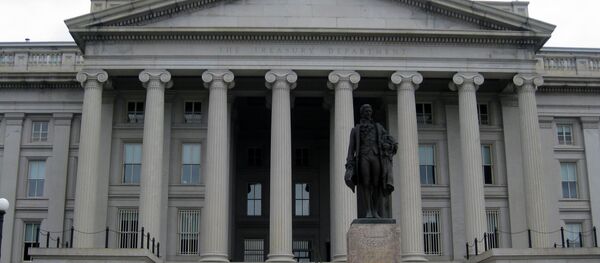On Monday, the 2014 extension of the US borrowing limit will reach its statutory limit, inhibiting the ability of the Treasury to finance government activities.
"The creditworthiness of the United States is not a bargaining chip, and I again urge Congress to address this matter without controversy or brinksmanship," US Treasury Secretary Jack Lew wrote in a letter to Congress on Friday.
He emphasized the unique role of the US Congress as the only body that "can extend the nation's borrowing authority," adding that "no Congress in our history has failed to meet that responsibility."
According to the statement, the Treasury has already stopped issuing state and local government securities. Secretary Lew's Friday letter advising Congress to raise the debt ceiling is the second one he has sent to Capitol Hill in the past month.
In 2011 and 2013 the Republican majority in the US House of Representatives held up an increase in the debt ceiling in an attempt to negotiate federal spending cuts. As a result of the 2011 stalemate the US debt was downgraded from its AAA rating for the first time in its history.
A faction among House and Senate Republicans remains committed to reducing the federal debt and deficit. House Budget Committee Chairman Tom Price has proposed an equivalent amount of spending cuts for every dollar in extra borrowing.
The end result of the Treasury Department's inability to issue additional debt "would ultimately lead to delays of payments for government activities, a default on the government's debt obligations, or both," the CBO report stated.
The CBO noted that without an increase in the debt limit, the Treasury "would probably have sufficient cash to make its payments through October or November."
Despite the warnings, the current congressional record shows no legislation has been introduced to address the debt ceiling deadline. The House of Representatives' Ways and Means Committee, which is responsible for such legislation, did not respond to requests for information regarding whether or not a new bill to raise the debt ceiling was in the process of being drafted.
In a Friday press release, credit rating agency Moody's weighed in on the debt ceiling debate, assuring that "the reinstatement of the statutory limit on the US debt…on 16 March does not pose a threat to the US government's ability to service its debt on a timely basis."
Moody's further reported that they expect the borrowing limit to be raised again "although the timing is uncertain." Moody's Senior Vice President Steven Hess is most concerned about the US payment on its interest, which he says will not be jeopardized when the borrowing limit is reached.
In February 2014, the US Congress passed the Temporary Debt Limit Extension Act, which authorized the United States to borrow up to $18.1 trillion through March 15, according to the CBO.
US Senate Majority Leader Mitch McConnell told the press last week that Republicans would not allow the United States to default on its debt.



